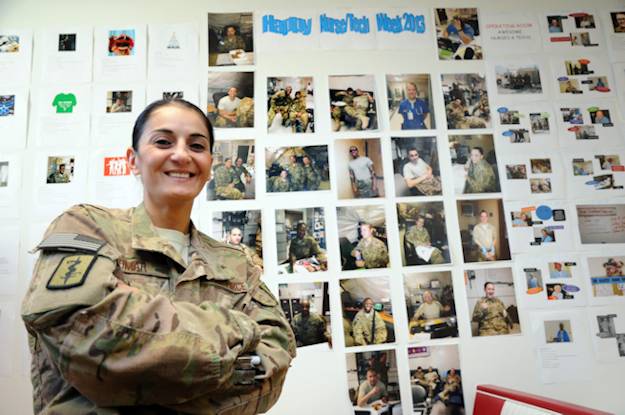|
BAGRAM AIRFIELD, Afghanistan (AFNS) -- After escaping the
violence of the Iran-Iraq War, a young girl and her family reached a
refugee camp in Turkey.
One of the things she still remembers
vividly from this journey are the large red crosses emblazoned on
the aid tents in the camp. After all, it was here that 1st Lt.
Wajeeha Omar first encountered an American nurse who worked in the
immunizations area -- an encounter that would later influence the
course of her own life.
|

May 9, 2013 - First Lt. Wajeeha Omar is the 455th Expeditionary Medical Operations Squadron patient movement nurse at the Craig Joint Theater Hospital on Bagram Airfield, Afghanistan. Omar chose to become a nurse after meeting medical personnel working at the refugee camp she spent time in as a youth. (U.S. Air Force photo
by Staff Sgt. David Dobrydney)
|
"Back then they wore the white dress and a pretty white
hat," Omar said.
After living in the camp without
access to regular showers, Omar felt rather embarrassed when
she got to the front of the immunization line, where the
wait could last for hours, when the nurse confidently
reached out her hand.
"It didn't bother
her," Omar said. "I could tell she was telling me not to be
afraid. She reassured me and ... was very comforting. It was
at that moment I wanted to be a nurse."
Today, Omar
is one of 120 American nurses and medical technicians at
Craig Joint Theater Hospital here, providing health care to
sick an injured service members.
Omar admitted that
at the time the dream of becoming a nurse seemed remote in a
culture that prized family and child-rearing above all.
"Living in the camp it was a very big dream, something I
didn't think would be possible," she said. "I didn't think I
would end up in America or a country where I would even go
to school."
Upon arriving in the United States in
1992, 13-year-old Omar was immediately placed in the ninth
grade and said she struggled in the new environment.
"It was a very frightening experience," she said.
As
time went by though, Omar found herself discovering the
world was more full of opportunities than she'd once
thought.
"Living in northern Iraq it seemed very
small; I didn't know the world was as big as it was," she
said.
Realizing that she could become a nurse if she
wanted to, Omar decided to go to nursing school while also
working full-time and raising a young daughter as a single
mother. Eventually, she was drawn toward the military to
help her continue her education.
From the time she
entered the service, Omar was keen to deploy, wanting to
provide the type of service she had benefited from long ago
in that refugee camp.
"I wanted to do the same thing
that others had done for us," she said. "I wanted to give
back to those who had given so much to ensure our care and
freedom."
Omar has now been in the Air Force more
than two years. Her current deployment to Bagram Airfield is
her first, and while her work is primarily processing the
paperwork that moves service members in and out of the
hospital, she realizes the importance of her role.
"It's a big part of the mission," she said. "I don't provide
their care directly, but I do send them home."
While
Omar still hopes to do more humanitarian work in the future,
today she's appreciative of the exposure the Air Force is
giving her to various aspects of nursing work.
"There's a huge variety, you never get bored," she said.
"I'm learning things here that I never heard of back home."
Omar's leadership considers her a vital part of the
Craig Joint Theater Hospital team.
"(Omar) is one of
the best, hardest-working officers I've had the pleasure of
working with in my 22-year career," said Lt. Col. Doug
Houston, the 455th Contingency Aeromedical Staging Facility
flight commander. "She's very meticulous with details and is
not afraid to hold people to standards. She has a bright
future ahead of her."
Omar said people often ask her
how she went from a refugee to a successful officer in the
Air Force, thinking that she's either extremely smart or
just had things handed to her. She said she has had to study
and work hard to reach this point.
"Almost everything
I have tried, I have failed the first time," she said, "Part
of me getting this far was not giving up ... and I continue
not to give up."
By USAF Staff Sgt. David Dobrydney
Air Force News Service
Copyright 2013
Comment on this article |



